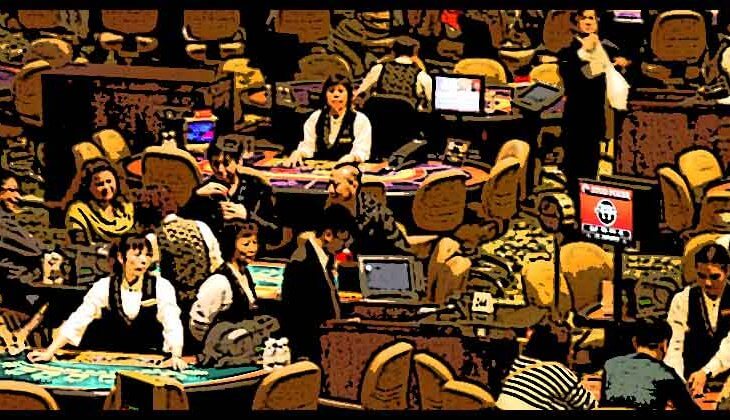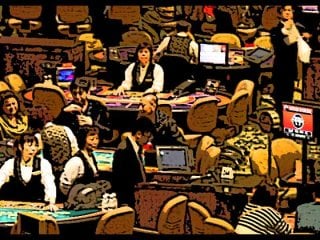How to Play Slow Roll Poker
By Alex Smith, Last updated Mar 23, 2024

The goal of poker is to beat your opponent; in fact, doing so is actively encouraged! However, while you should always try your best to throw your opponents off-balance and coerce them to make mistakes – there are certain things that you should never do at the poker table. Slow rolling is one of them.
You see, despite not necessarily breaking the rules, a slow roll poker movement is very against poker etiquette. Poker etiquette is, basically, a set of unwritten rules that players at the table are expected to follow.
The slow poker roll is one of the most significant moves you can make at a poker table that breaches these rules – and while an accidentally slow roll is excusable, continued slow rolling is likely to cause problems at the table. Some poker rooms can even cause you to receive a time-out!
This page will look at what a slow roll poker movement is – how you can avoid it – and why it’s so frowned upon at the table.
What is Slow Rolling?
A slow roll in a poker game is when you have a firm hand – one that will almost always end up winning the hand – but you take a LONG time to make an easy call. For example, if you have the nuts – the absolute best possible hand – and your opponent shoves “all in” on the showdown, you would be expected to call them promptly. If you took a long time to make this call – pretending that you had a big decision on your hands – this would be considered slow rolling.

$35
No Maximum
40x
No code required
–
–
Yes

$10; $20 if depositing via BTC
N/A
20x (deposit+bonus)
–
–
$110
Yes
There is also a second type of slow-rolling: If you hold the absolute nuts but wait for your opponent to turn over his or her hand before you, that’s considered slow rolling. Why? Because you are giving them the impression that they might hold the winning hand. It’s unfair, and a slow poker roll like this will get you a lot of flack at the table.
While there isn’t one dictionary definition of slow-rolling, most poker players will have encountered it at least once. Being slow-rolled isn’t fun, and poker players can get furious when you do it in a live environment.
Why is Slow Rolling Considered to Be Bad?
Slow rolling is considered a bad thing because, with a few limited exceptions, the only thing you can gain from it is annoying your opponents. If you know that you hold the winning hand, taunting your opponent into thinking they will win the pot is terrible taste – and lousy sportsmanship. You should avoid slow-rolling while playing poker to ensure you are showing your opponents respect and common courtesy.
Another major downside to slow rolling is that it slows down the game. If you have a player at the table who’s constantly taking forever to turn over their hand, everyone else at the table suffers too. The gameplay slows, and, in the case of a tournament, it can end up being incredibly annoying.
Does Slow Rolling Break the Rules?
One of the main arguments slow rollers use is that there’s nothing in the official rules about slow rolling. Technically, this is true; the official poker rules handbook doesn’t state any period during a showdown in which you have to show your hand. This means that it’s rare for slow rollers to receive any official penalties at the poker table. For example, being forced to sit out a round or two is pretty unlikely.
However, this isn’t always the case; if you’re playing at a land-based casino you don’t usually frequent, you may come across a poker room manager who doesn’t like what you’re doing. If you continue to slow roll after being warned, they could very well hand you a penalty. Ultimately, they have the last word on what can and can’t happen within their poker room.
How to Avoid Being a Slow Roller
While it’s normal to do an accidental slow roll sometimes, slow rolling in poker should not become a regular part of your game. However, dealers and other players realize that we all get confused sometimes, so don’t worry too much about the occasional slow roll. That being said, you should always try to avoid slow-rolling where possible. Thankfully, by following a few simple steps, you should be able to avoid 99% of slow-rolling situations.
Firstly, always muck your hand or reveal your cards when it’s your turn. Keep an eye on where the action is currently, and don’t be afraid to ask the dealer if you are lost and can’t see where the action is.
If you know that you have the nuts – the absolute best hand that is unbeatable – turn your hand over unless there is an excellent reason not to. Similarly, if another player at the table says something like “you’ve got it,” or “nice hand,” turn your hand over promptly; they admit they don’t have a hand.
Five Reasons to Avoid Slow Rolling
Now that you have an idea of why you should avoid slow-rolling, let’s take a more in-depth look at five reasons why it’s not recommended.
It Annoys Players and Causes Friction
The primary reason slow rolling is discouraged by so many players is that it causes you to make enemies at the table! Seriously! When you slow roll someone, it can cause people to become irate – and there have been MANY cases where poker tables have been flipped over, or even physical fights started – just because one of the players at the table slowly rolled someone!
What’s more, if you constantly slow roll, you will likely become a target for other players at the table. They will likely try and catch your bluffs, so you must adapt your playing style entirely if you want to continue surviving at the table!
It can Scare off the Fish.
You will likely scare away the fish if you constantly try to slow roll someone. The last thing you want to do is make a fish feel embarrassed or anxious at the poker table. They are more likely to simply up and leave – and today, with fewer fish than ever, that’s just not something you want to be doing.
It Can Damage Your Reputation
Despite poker spanning hundreds of countries, you would be amazed at how small the poker community is. Sure, you probably won’t know the name of everyone at your local land-based casino – but you probably recognize a few faces. Since the poker community is so tight-knit, it can be straightforward for a particular player to gain a poor reputation.
If there is chatter about you cheating, refusing to pay debts, or acting like a jerk at the table, these rumors can spread very quickly. If you want to maintain a good reputation within the poker community (as you should), you must avoid doing things at the table that can break or damage your reputation. Word spreads fast – trust us!
It Slows Gameplay
We covered this briefly, but it’s important to remember that slow-rolling slows down the game. That’s even in the name! Today, in land-based casinos, many players complain about the speed of poker. They are used to playing online, where the gameplay is much faster. With so many people in the poker community already finding the game slow, those who are slow-rolled will probably find it even slower!
This is especially important in tournaments; with the gameplay speed crucial to the result of the game, players are likely to point this behavior out if they’re playing in a tournament environment.
Another aspect to consider in terms of speed is that not all land-based casinos are open 24 hours a day, seven days a week. This means if you’re playing poker in a land-based casino that isn’t open 24 hours a day, seven days a week.
You May Get in Trouble
While we’ve covered the likelihood of getting in trouble if you slow roll in a land-based casino (it’s pretty unlikely but not unheard of), you should be aware that in a home game environment, slow rolling in poker could get you booted from the game. When you play poker in a land-based casino, the casino is obliged to let anyone join the game – provided they aren’t banned from the premises.
However, at a home or private game, the rules change; the host of the game doesn’t need to let you play if they don’t want to. So, if you act like a jerk at the table, they are within their right to tell you to leave simply!
This is especially important to remember if you’re playing in an area without many land-based casinos. Typically, these areas will rely on home games – so if you get booted from just one, you could find that word gets around much more than you think, and you will automatically be uninvited for any other games.
FAQs
What happens if I’m slow-rolled?
If you are slow-rolled, there isn’t much you can do aside from alerting the dealer. They are unlikely to take action unless multiple players are complaining about it or unless it’s happening a lot.
If you feel it’s becoming a problem, don’t be afraid to speak to the poker room manager. Once you alert them to the problem, they may start to take a closer look – and if they see the perpetrator constantly slow roll with the winning hand, they will take action against the player.
Will I get in trouble for accidental slow rolls?
No, if you occasionally fail to show the winning hand first, provided it’s an accident and doesn’t happen too often, you won’t get into trouble. However, you should be actively trying not to slow roll. Doing so is terrible etiquette and will not win you any fans at the poker table.
So, for example, if you place an all-in bet, and your opponent calls, and you have the nuts – flip that hand over right away. It’s better to be well-liked at the poker table than disliked.
What is slow rolling in poker?
A slow roll in a poker game is when you have a firm hand – one that is almost always going to end up winning the hand – but you end up taking a LONG time to make an easy call.
For example, if you have the nuts – the absolute best possible hand – and your opponent shoves “all in” on the showdown, you would be expected to call them promptly. If you took a long time to make this call – pretending that you had a big decision on your hands – this would be considered slow rolling.

$35
No Maximum
40x
No code required
–
–
Yes
Are online slow rolls possible?
No, it’s not possible to slow roll in online poker. Why? Because when you play online poker, the cards are turned over automatically at the end of the hand. You simply don’t have the ability to slow roll as the poker software makes all of the decisions for you.
While it’s true that there are some things you can do in online poker that equate to bad etiquette, slow rolling isn’t one of them. It’s yet another reason why so many players like to play online poker; it’s a much faster way of playing poker, and things like slow rolls just aren’t a problem, so there are fewer things to worry about.
Poket Related Articles
How Many Hands Per Hour: Live Poker Explained
In this blog post, we’ll dive into the factors influencing the number of hands dealt per hour in live poker.
How Does a Casino Make Money on Poker?
It will come as no surprise to learn that online poker sites and online casinos are in the business of making money; that’s their ultimate goal, and while many of these sites may offer attractive – and lucrative – bonuses and promotions designed to temp in new players, the ultimate goal is to generate as much revenue as possible.
What is the Dead Man’s Hand in Poker?
The deadman’s hand is one of the most iconic hands in poker. While some players have slightly different definitions of the dead man’s hand, most people regard it as a hand containing two Aces and two Eights – equalling two pairs. However, while the hand may look quite simple, there is much more to meet the eye.
What Happened to Mike Matusow
If you’re wondering what’s actually happened to Mike Matusow – and want to know what this colorful character is up to these days – keep reading to find out what this star poker player is up to these days!
How to Play Red Dog
Red Dog, also known as Red Dog Poker, is quite a popular game. Today, you will find it offered at most online casinos. Some land-based casinos also offer it, although it’s not found as commonly.




 Top 5 casinos
Top 5 casinos 

